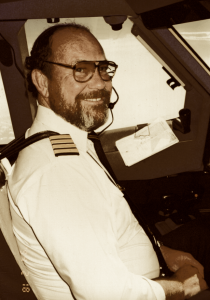
Flight has been one of the most transformational activities that humankind has experienced. In this post, we look at a precious lesson that flying can offer to CEOs and leaders for these times of complexity and uncertainty.
Soaring with science
How do we know things? Largely through our senses and our experience. Fire burns, sugar tastes good. As Seth Godin put it, “We’re hardwired to believe and understand the things we can actually experience.”
If we relied on our senses and on our hearts instead of our educated minds, we would be overcome by fear. The development of science helped us evolve to a higher level of knowledge beyond our senses and fears, one where hypotheses could be formed and tested and general laws abstracted from that empirical information. With knowledge, as a species we have learned to extend our capabilities, from navigating and plumbing the depths of the seas, to flying through the sky and beyond into space. Scientific knowledge has propelled us towards increasingly broader and deeper dimensions, from the sub-atomic realm to the galaxies. This exploration has been made possible by solid theory and an epistemological framework to guide in-the-field practice.
When it comes to management, we can and must rely on important knowledge beyond our senses. This can come, for example, from a statistical understanding of how processes are behaving. This knowledge allows managers to predict and assess the impact of decisions. This is just one example of knowledge that comes from solid theory and that allows informed management practice. The problem is, statistics don’t “feel real” and humans find it hard to rely on them.
Still today, in spite of everything that we have learned from science about systems, complexity, networks and the collaborative nature of work, so many CEOS and leaders still operate “by the seat of their pants”, either inventing the wheel or repeating old ways. Many are still unaware that a theory of management exists to guide their practice. Ignoring it is inherently self-limiting. It is also dangerous.
Flying blind
When John F. Kennedy Jr.’s plane crashed into the sea in 1999, I asked my brother, a former RAF pilot, what he thought. He had little doubt. Kennedy had not yet learned to fly a plane by instruments. In the daytime, pilots can be guided by what they can see, but at nighttime, their perceptions are faulty and they can become disoriented. That is why they must learn to fly by instruments for flights later in the day and at night. My brother himself, who had flown reconnaissance aircraft, Shackleton’s, even a friend’s Spitfire, found it challenging when he had to learn to captain large commercial planes that were highly computerized. He had to acquire a new set of skills and fly not just with instruments but with a computer. He had to adapt his knowledge and experience to the times.
Knowing the mission and the destination – what CEOS and leaders need
A captain has to take responsibility for the mission, the destination and the lives of all those on board. CEOs and leaders are in a similar position when it comes to organizations. Today we are living in an age of complexity. The terrain has changed and we need a new map, adequate knowledge and skills. CEOs and leaders can serve their mission, destination and everyone involved much better by acquiring the necessary thinking processes and knowledge to guide organizations beyond the seat of their pants and Excel spreadsheets. This is why we developed the Decalogue methodology for managing organizations as whole systems.
When the heart informs the mind, there can be an excess of fear. But when the mind informs the heart, we become unstoppable,
This post is dedicated to the memory of Captain Charles M. Montgomery and to all those pilots who make our lives bigger.
Intelligent Management has been guiding organizations to adopt a systemic approach to manage complexity and radically improve performance and growth for over 20 years through our Decalogue management methodology. The Network of Projects organization design we developed is supported by our Ess3ntial software for multi-project finite scheduling based on the Critical Chain algorithm.
See our latest books: The Human Constraint from Routledge; From Silos to Networks: A New Kind of Science for Management from Springer; Moving the Chains: An Operational Solution for Embracing Complexity in the Digital Age by our Founder Dr. Domenico Lepore, and ‘Quality, Involvement, Flow: The Systemic Organization’ from CRC Press, New York by Dr. Domenico Lepore, Dr. Angela Montgomery and Dr. Giovanni Siepe.







Leave a Reply